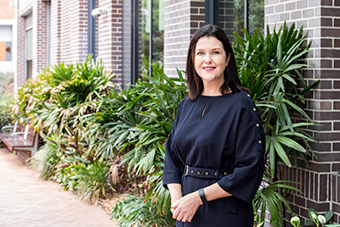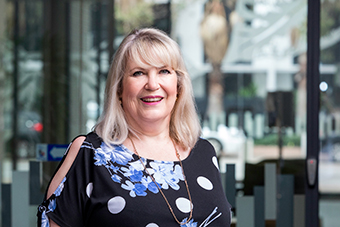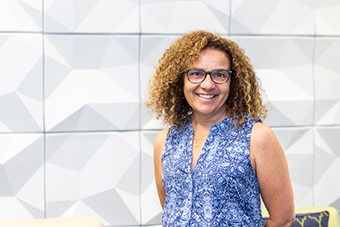
Regular cancer screening may save your life
Regina Marchant’s Breast Screening
and Early Cancer Detection Journey

Regina Marchant
Lindfield resident, wife and working mother of two

Meredith Kay
Director of BreastScreen NSW in Northern Sydney and Central Coast

Dr Gilda Brunello
Cremorne based General Practitioner
Regina Marchant, Lindfield resident, wife and working mother of two, was diagnosed with breast cancer at Sydney’s Royal North Shore Hospital in August 2014, just two months after her 50th birthday.
Back then, she was just another busy woman trying to juggle a full-time job and a family life with two teenage children.
After some positive nagging from her husband, Regina called Breast Screen NSW and booked in for a routine mammogram. And due to Regina merely taking 20 minutes out of a busy day, the early detection of her breast cancer has meant she is here to share her story.
“I was a fit and healthy 50-year old who regularly self-examined and had no cause for concern. I had even had a mammogram in my mid-40s, and that had been fine, so nothing to fear. A few days after my mammogram, I received a letter in the post from BreastScreen inviting me back to have a few more tests to complete my screening. While the letter told me that one woman in twenty is invited back and that 90% of them are fine, I still felt a little anxious. Without delay, I organised the follow-up appointment, and was back at BreastScreen just a week later,” says Regina
“Many people think that a family history of breast cancer puts you at the greatest risk of developing this type of cancer, but age and being female are actually the two biggest risk factors. Research tells us that 9 out of 10 women who develop breast cancer do not have a family history of breast cancer. Therefore, women aged 50-74 years, should have regular screening mammograms regardless of family history,” says Director of BreastScreen NSW in Northern Sydney and Central Coast, Meredith Kay.
After further mammograms and an ultrasound, a radiologist explained to Regina she needed a biopsy- a tissue sample taken from a person for in -depth medical analysis. A week later Regina met with a BreastScreen NSW doctor and counsellor to review the biopsy results.
At the meeting the doctor explained to Regina that she had a Ductal Carcinoma in Situ (DCIS). This is abnormal or cancerous cells contained inside Regina’s breast milk ducts. These may develop into invasive breast cancer, spread in the body and cause death. Treatment was recommended without delay.
“BreastScreen provided me with a list of specialist’s oncologists and referred me back to my GP. My GP helped me select an oncologist and set up an appointment with her. Over the next few weeks, I had further consultations, biopsies, ultrasounds, and an MRI to complete the diagnosis and help determine the best treatment. In my case, I had high range DCIS in three areas of the breast and was recommended to have a mastectomy.”
In October 2014, Regina underwent a mastectomy (surgery that may be either full or partial removal of the breast) with skin preserving reconstruction. In addition, Regina had another biopsy, of her sentinel lymph node to check if any potentially cancerous cells had spread. The good news was they hadn’t.
“Having gone through this experience, I have become very aware of other women who have been diagnosed with breast cancer, but often at a later stage. Their journeys have been tougher than mine and, in some cases, they have lost the battle. This has made me realise how lucky I was to be screened and detected early,” says Regina.
“Screening is important, because for things like breast cancer, a mammogram can pick-up the early signs of abnormalities. They are such a tiny size that there is no way you could ever feel or see it. If the cancer is there, then we go onto investigate and test further with things like ultrasounds and biopsies. Regular mammograms every two years remain the clinically recommended method of detecting breast cancer early, and women who have their breast cancer detected early through a screening are statistically much less likely to need a mastectomy or chemotherapy. Prevention is the key,” says Cremorne based GP Dr Gilda Brunello.
To increase cancer screening rates across the region Sydney North Health Network (SNHN) is working with primary health care practices to help reduce the burden (incidence, morbidity and mortality) of these diseases in the community.
SNHN offers general practices access to data extraction tools to assist them to understand their patient population and areas for quality improvement. This patient data is reviewed by the General Practice to help them better understand the status of their patients’ health. The information is then de-identified and shared with the SNHN team for further analysis, helping facilitate the targeting of key patient groups for proactive health management with the General Practice, including lifting cancer screening rates.
A baseline of screening rates is established within the General Practice. The aim of this is to identify pockets of patients who have lower screening rates than those recorded for NSW and other northern Sydney regional practices. A ‘model for improvement’ (also known as the plan, do, study, act cycle – PDSA) is created with the practice and improvement goals are set for working towards increasing early detection screening rates for breast, cervical and bowel cancers. As the year progresses, SNHN’s Primary Care Advancement Team continues to receive updated de-identified data, meeting quarterly with the practice to offer feedback for further improvement activities.
Many women can find it difficult to find the time for that first breast screening. Women can feel the early detection tests can be invasive and be confronting. However, it’s known that earlier screening can save lives and lead to successful treatment.
“Don’t wait for an invitation. Call BreastScreen NSW today and book in your mammogram. It could save your life, it saved mine. Call 13 20 50 and book an appointment today,” encourages Regina
“My journey would have been very different if I hadn’t been diagnosed early. Yes, having cancer was upsetting and hard for me and my beautiful family, but because I detected the cancer early through screening I was able to have a mastectomy and the treatment necessary to beat cancer and continue to be a mother, wife and now breast screening advocate,” says Regina.

Regina Marchant
Lindfield resident, wife and
working mother of two
“Having gone through this experience, I have become very aware of other women who have been diagnosed with breast cancer, but often at a later stage. Their journeys have been tougher than mine and, in some cases, they have lost the battle. This has made me realise how lucky I was to be screened and detected early,”

Meredith Kay
Director of BreastScreen NSW in Northern Sydney and Central Coast
“Many people think that a family history of breast cancer puts you at the greatest risk of developing this type of cancer, but age and being female are actually the two biggest risk factors. Research tells us that 9 out of 10 women who develop breast cancer do not have a family history of breast cancer. “

Dr Gilda Brunello
Cremorne based General Practitioner
“Regular mammograms every two years remain the clinically recommended method of detecting breast cancer early, and women who have their breast cancer detected early through a screening are statistically much less likely to need a mastectomy or chemotherapy. Prevention is the key.“
